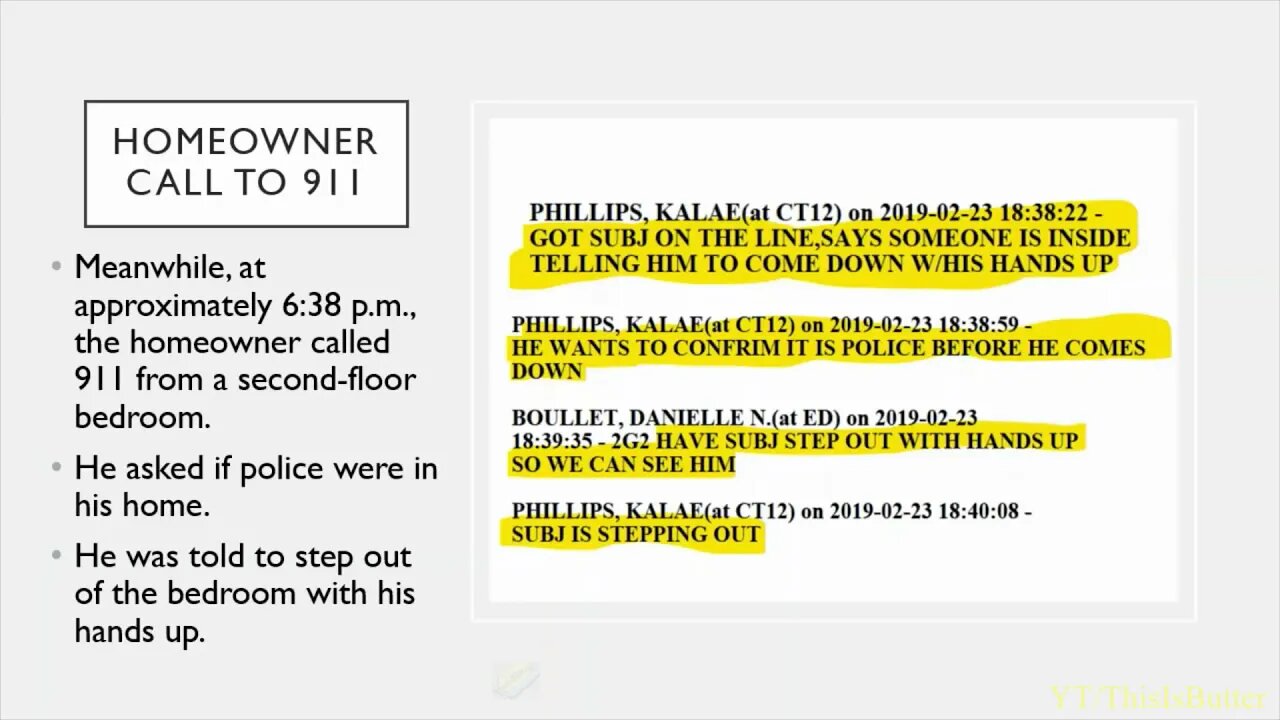Premium Only Content

Welfare check at man's Seattle home ends in him being cuffed, lawsuit
Keep me motivated by donating to https://paypal.me/thisisbutter
Viewer discretion is always advised when watching this video or any others videos. I do not take any responsibility to your trauma, psychological and/or mental harm.
I do not recommend anyone to attempt, act/reproduce, and/or create hate from what you see in this video or any other videos.
Enjoy.
--------------------
A 74-year-old Seattle man has filed a civil federal lawsuit against the city and the Seattle Police Department over how he was treated inside his own home during a welfare check by officers two years ago.
Howard McCay filed the suit last August in U.S. District Court, alleging that Seattle police violated his Fourth Amendment right to an unreasonable search without a court order.
A spokesperson for the Seattle City Attorney's Office declined comment because it involves pending litigation, which has not yet been heard by a judge.
McCay says he was asleep one evening in February 2019 when police officers entered the Capitol Hill home where he has lived for 48 years. Someone had called the police non-emergency line to report what they thought was something unusual at McCay’s two-story house.
“My neighbor’s house is in a weird state," the caller said. "The doors are all open.”
The four Seattle police officers arrived at the home an hour later.
The dispatchers treated it as a Priority 2, non-emergency call and classified it as a welfare check, which police are often called upon to do.
The officers who arrived waited six minutes outside the open front door before going inside.
Officers are heard on their body cam video, saying, “Seattle Police Department, conducting a building search!”
McCay said he suffers from tinnitus and had his television volume up very loud to avoid the ringing he hears in his ears, a symptom of the condition for those who suffer from the ailment.
“They often run police dramas, so I didn't even wake up at the beginning, figuring it was police noise on the TV,” he said.
But by this time, the officers who had been searching his downstairs were about to climb the stairs toward McCay’s upstairs bedroom, which is where he was.
“When I finally became aware there were intruders in the house, I called 911” he said.
He told the 911 operator that people he didn't know were inside his home.
“I’m suffering from a home invasion, there’s a person yelling at my door, ‘Come out with your hands up,'" he told the dispatcher.
The police officers, with their guns drawn, were standing just outside his bedroom door as one of the officer receives word that McCay is on the phone with 911 and tells him to come out of his room, which he did.
The officer's body cameras show McCay exiting his room with his hands up and obeying the officers' commands as they point their guns at him. The video did not show the officers telling him why they are inside his house after he asks.
Officer try to handcuff McCay, who was 72 at the time, as the former longshoreman screams out in pain, telling officers he has a bad shoulder. Despite that, the officers worked hard to try and put his hands behind this back in order to handcuff him.
“It hurts, it hurts!" he told the officers. "Please leave me alone!”
It wasn’t until he was cuffed and slid down the stair in his residence did the officers explain why they were there and what they were doing.
“Apparently, their procedures are handcuff everybody first and then ask them who they are,” McCay said Thursday. “I don't agree with that and I hope the people of Seattle don't agree with that."
McCay said he turned to the courts to shine a light on police arrest techniques.
“I was intending for my case to be an example of how wrong the current system is,” he said, adding that he would like 911 dispatchers to triage welfare check calls away from police officers and toward the Seattle Fire Department or EMTs instead of police officers, who in McCay's case, entered his home with guns drawn.
“The city needs to develop a different kind of sensitivity of what is appropriate,” McCay said. “You send a welfare person. You don't send armed thugs with assault rifles into a private house lacking a Fourth Amendment warrant.”
Rebecca Talbot, one of two attorneys who represent McCay, say city policy needs to change to prevent anyone involved in welfare check calss from getting hurt, including police officers.
“Because it's so dangerous to enter a home with no information about what's inside, that's why police aren't supposed to do it unless there's a true emergency,” she said. “It might be at the training level that we need to actually teach them to follow the Constitution.”
McCay did not file a complaint with the Office of Police Accountability, but because the incident involved police use of force, OPA did investigate. The civilian review agency found no wrong doing and concluded that officers had followed SPD policy.
-
 LIVE
LIVE
ItsLancOfficial
7 hours agoWE LIVE 🔴WE LIVE 🔴 SUNDAY SUNDAYS!!!!!!! TARKOV
526 watching -
 4:09:32
4:09:32
EricJohnPizzaArtist
6 days agoAwesome Sauce PIZZA ART LIVE Ep. #59: Are You Ready for some FOOTBALL with GameOn!
21.2K7 -
 1:21:43
1:21:43
Jake Shields' Fight Back Podcast
13 hours agoJake Shields and Paul Miller!
56.2K100 -
 1:20:41
1:20:41
TRAGIKxGHOST
4 hours agoTrying to get SCARED tonight! | Are You SCARED!? | Screams Beyond Midnight | Grab a Snack
16.5K2 -
 5:21:24
5:21:24
StuffCentral
6 hours agoI'm baaack (no you can't play with me.. unless you a healer)
18.8K4 -
 2:25:11
2:25:11
TheSaltyCracker
7 hours agoTrump Is Not Dead ReEEeStream 8-31-25
89.7K121 -
 3:09:16
3:09:16
THOUGHTCAST With Jeff D.
5 hours ago $3.39 earnedLabor Day Weekend FORTNITE With THOUGHTCAST Jeff & the squad
22K4 -
 3:44:05
3:44:05
Rallied
8 hours ago $4.37 earnedSolo Challenges All Day
47.2K1 -
 LIVE
LIVE
iCheapshot
8 hours ago $0.45 earnedCall of Duty: Black Ops Campaign
48 watching -
 4:39:16
4:39:16
Meisters of Madness
9 hours agoMadness in a Pod
10.8K1